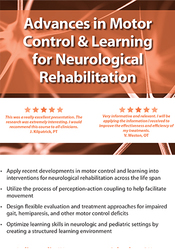

In many rehabilitation settings, therapists are faced with the challenge of how best to teach motor skills to patients. In pediatric settings, the challenge is to optimize the learning of new skills, while in neurologic and geriatric settings, therapists primarily focus on changing inappropriate motor behavior and the re-learning of motor skills. Successful therapists must be able to accurately determine the cause of motor skill impairments and then design treatment approaches that facilitate the learning or re-learning of motor skills. In today's fast paced health care environment, therapists must be adept in structuring the learning environment to promote the quickest and longest lasting changes in a patient's motor skills.
In this course, you will examine current theoretical and applied perspectives in the field of motor control and learning and will discuss their implications for therapeutic evaluation and treatment. Course discussion will be focused at the behavioral level and will compare and contrast information processing and dynamic systems models in understanding normal and pathological human motor behavior. Implications for treatment stemming from both approaches will be examined. You will constructively criticize current assumptions underlying motor control rehabilitation and discuss how theoretical frameworks bias evaluation and treatment options. Given an understanding of past and current approaches to motor control and learning, you will be able to flexibly design their own unique treatment approaches to optimize functional outcomes in each patient.
is an AOTA Approved Provider of continuing education. This course is offered for .65 AOTA CEU(s). The assignment of AOTA CEUs does not imply endorsement of specific course content, products, or clinical procedures by AOTA. AOTA Educational level Intermediate, Category 1: Domain of OT, 2: Occupational Therapy Process, .
is an approved provider #50-466 with the Florida Department of Health Board of Occupational Therapy Practice. This course is approved for 6.5 contact hour(s) for Occupational Therapist and Occupational Therapy Assistants.
This educational offering qualifies for 6.5 continuing education hour(s) as required by many national, state and local licensing boards and professional organizations. Save your course outline and certificate of completion, and contact your own board or organization for specific filing requirements.
This program has been approved by the Arkansas State Board Of Physical Therapy for 6.5 contact hour(s) for Physical Therapists.
is a Registered Physical Therapy Continuing Education Sponsor through the State of Illinois Department of Financial and Professional Regulation, Division of Professional Regulation. License #:216.000309. This course qualifies for 6.5 CE Credit Hour(s).
This meets the IN-PT approval under 844 IAC 6-8-5 Approved Organizations #9, please contact IN Board or Association if you have questions.
This program has been submitted to the Maryland Board of Physical Therapy Examiners for pre-approval of 6.5 continuing education hour(s).
is recognized by the New York State Education Department's State Board for Physical Therapy as an approved provider for physical therapy and physical therapist assistant continuing education. This seminar is awarded 7.8 contact hour(s).
This program has been submitted to the Oklahoma State Board of Medical Licensure & Supervision for preapproval of 6.5 contact hour(s).
| File type | File name | Number of pages | |
|---|---|---|---|
| Slide Deck | Course PowerPoint_Advances in Motor Control and Learning for Neurological Rehab (15.48 MB) | Available after Purchase | |
| Course Manual_Advances in Motor Control and Learning for Neurological Rehab (8.50 MB) | Available after Purchase |
BEN SIDAWAY, BSc, MA, PhD, MPT, is a professor of physical therapy at Husson College in Maine where he teaches motor control and learning, anatomy, neuroscience and research methods. He also operates his own home health rehabilitation practice and is the Director of the Kenduskeag Institute’s Human Performance Lab. Dr. Sidaway has practiced in neurologic, orthopedic, pediatric and geriatric settings. Prior to teaching at Husson College, Dr. Sidaway was a professor of motor control and learning at Louisiana State University where he received two Outstanding Teacher awards. Dr. Sidaway is originally from England where he earned a BSc in kinesiology at Loughborough University of Technology. He undertook postgraduate work in physical habilitation at Liverpool University and later earned an MA in motor behavior and biomechanics from the University of North Carolina at Chapel Hill, a PhD from Penn State University in motor learning and control and an MPT from Husson College.
Dr. Sidaway has an extensive research background in motor control and learning with over 100 published papers and abstracts in national and international peer-reviewed journals. He regularly presents at scientific conferences and has made numerous invited presentations in the U.S. and Great Britain. Dr. Sidaway has previously served as the associate editor of the international journal Human Movement Science and regularly reviews for other journals, including Physical Therapy, the official journal of the American Physical Therapy Association.
MODELS OF MOTOR CONTROL
CASE STUDIES
APPROACHES TO NEUROLOGICAL REHABILITATION
CASE STUDIES
ASSESSING MOTOR LEARNING
TRANSFER OF LEARNING VS. SPECIFICITY OF PRACTICE
PART-WHOLE PRACTICE TECHNIQUES
STUCTURING THE LEARNING ENVIRONMENT
CASE STUDIES
PERCEPTION-ACTION COUPLING
| 5 |
|
| 4 |
|
| 3 |
|
| 2 |
|
| 1 |
|
Satisfaction Guarantee
Your satisfaction is our goal and our guarantee. Concerns should be addressed to: PO Box 1000, Eau Claire, WI 54702-1000 or call 1-800-844-8260.
ADA Needs
We would be happy to accommodate your ADA needs; please call our Customer Service Department for more information at 1-800-844-8260.
Please wait ...